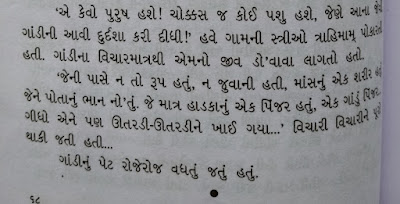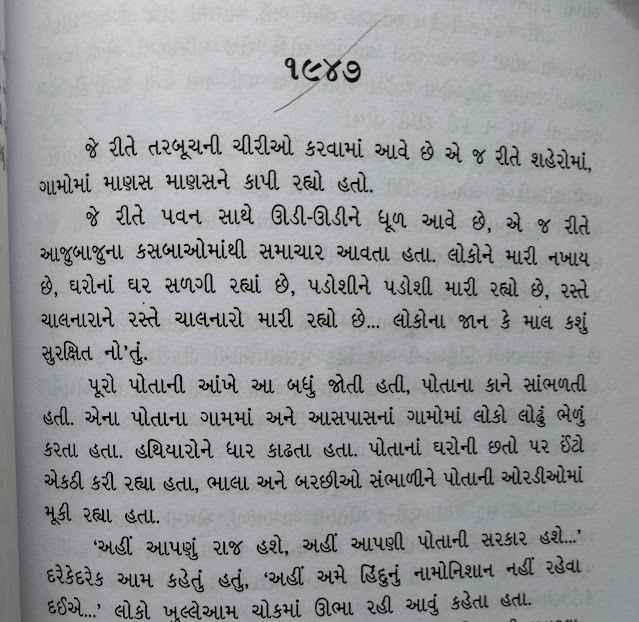Pinjar: Unveiling Identity Amidst Partition's Turmoil
Hello readers,
Welcome once again, as Amrita Pritam with her rebellious thoughts always captivates me. Finally, I found one of her books, so in this blog, we will review the novel.
Partition is always a subject of controversy, especially that phase known for the chaos created by a line drawn by an outsider, a Britisher, who didn't even know the geography of the country. The border between India and Pakistan was drawn by Sir Cyril Radcliffe, a British lawyer and Law Lord. This line drawn on paper led to massacres, bloodshed, family separation, and much more.
The book is set against the backdrop of partition. The Gujarati translation was done by Shrifa Vijlivala. While talking about Pinjar, Sharifa stated that in these double-edged sword incidents of partition, only literature can capture the situation of common people. We know that whether it is war or communal riots, Vietnam or Afghanistan, India or Pakistan, the women suffered the consequences.
The novel is about the loss of identity in order to survive during that time. Puro, the Hindu girl turned Muslim as a result of the partition, experiences this story of uprooting and being replanted in new soil. She was kidnapped by her husband and then loved by him. Isn't it a contradiction that she was kidnapped because her husband loves her?
The story moves back and forth; Amrita uses the technique of past and present to capture the wounds inflicted by the partition on individuals. However, it's not just her story but that of all the women who felt this identity crisis. She presents all the women who were victims of rape by other communities as a means of revenge and murder.
Puro's father somehow saved their hereditary house. This, again, is ironic. As H.G. Wells said, life is a mere campsite, so why run after surnames, inheritance, lineage, etc.? Another vice was having more than two children; even Puro has five other siblings. Every culture has stories, myths, and superstitions. If we look at this through Frye's archetypal theory, then for having a boy child, every culture performed some Pujavidhi as a skeleton key for it. This story also captures this very well with the Vidhimata story.
"સિંહ તો ફાડીને ખાય જાય પાન રિચ ઉપાડીને લઇ જાય અને સ્ત્રીને પોતાની બનાવીને રાખે. "
Rashid, a kidnapper and later husband of Puro, insists on her marrying him forcefully. He never tried to force her, at the same time telling her to marry. In the patriarchal world, on the surface, they were telling you that they respected women, but in reality, they ruled over them.
When she successfully escaped from Rashid, her father denied accepting her for the sake of their family and reputation, telling her,
"દિકરી તું જન્મતાની સાથે જ મારી ગયે હોત તો કેવુ સારુ."
"પુરોને એવુ લાગ્યુ કા આ પંદર દિવસો એ બધુ એનુ માસ ઓગલી નાખ્યુ છે, છે એ નારી હડપિંજર છે, નાતો એને કોઈ અકાર છે, ના તો માણસ, ના મરજી."
"સગા માબાપે જ ધક્કો મારી દીધો પછી આ ગામમાં શું દાટ્યું હતું."
"અજાણીગાયો ના તોલા માં પોતે ખોવાયેલી વાછડી હોય એવુ લાગતું હતું."
Rashid even forcefully tattooed her name as her Muslim name, Hamida. The forceful writing of names or changing the name of a girl has long back stories. It never allows the girl to be with her identity but rather to grasp a new one all of a sudden.
"હકીકત માં નતો એ પૂરો હતી ના તો હમીદા, એતો માત્ર હળપિંજર હતી, કેવા એક પિંજર નતો એનો કોઈ અકાર હતો ના તો કોઈ નામ."
Vaishakhi is the most celebrated festival of Punjabis. Puro stared at the celebration of it, thinking about the songs Jats were singing. They said if they liked someone, they would definitely catch them. Here Puro mused why they caught them. Is there any place for songs of her misery? Are there any bhajans which deny God?
"પૂરો વિચારવા લાગી આ છોકરો, આ છોકરાનો બાપ, આખી પુરુષજાતી, પુરુષ પુરુષ. કૂતરો હાડકું ચૂસે એમ પુરુષો સ્ત્રીના શરીરને ચૂસી નાંખે છે."
"દીકરીને દરેક પ્રકારના પાણી માફક આવી જાય છે."
"રશીદે પૂરોના શરીર ને મેળવી લીધું હતું પારંતુ એને તરસ હતી પૂરો ના મનમાં, આત્મામાં ઉતરી જવાની."
Amrita captures the ups and downs of Puro's life. She became a mother, developed relationships with others, played the role of a wife; nonetheless, she was burning from inside. Her identity is lingering and not finding a way.
Additionally, Amrita captures the partition in her story and the agony of all the women who were displaced during the time. They cannot belong anywhere now.
Thank you for being till the end. I hope you found out worth reading it.






No comments:
Post a Comment